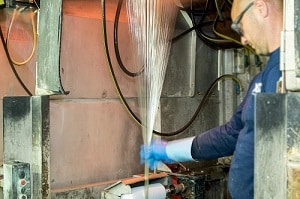They are excellent crosslinkers and adhesion promoters for aqueous coatings systems, being waterproof for component coatings
 LANXESS a speciality chemicals company, has expanded its unique Trixene Aqua range of water-based blocked isocyanate dispersions. The product family now includes new grades, specifically designed to expand the application areas and meet more demanding customer needs.
LANXESS a speciality chemicals company, has expanded its unique Trixene Aqua range of water-based blocked isocyanate dispersions. The product family now includes new grades, specifically designed to expand the application areas and meet more demanding customer needs.
Trixene Aqua BI 120 expands the outstanding performance as an adhesion promoter of Aqua BI 220, enabling formulators to use it in a wide pH range and further enhancing soft handle. This is beneficial in textile processing where the products can be used e.g. for hydrophobic resins applied in the waterproof treatment, for breathable fabrics, and for silk screen printing to improve the prints’ resistance to wash cycles.
As a nonionic product, Trixene Aqua BI 522 is designed to achieve harder coating, with superior chemical resistance and good drying characteristics. It is applied to metal and glass surfaces. Glasses, for example, are given excellent durability by this coating agent.
Trixene Aqua BI 202 is born by LANXESS’ continuous focus on fibre sizing technologies, whereas the formulator can benefit from its combination with Witcobond polyurethane dispersions. The use of Aqua BI 202 can improve the strength of the chopped glass strands and impart composites higher mechanical, flexural properties, as well as improve impact resistance. Glass fibres are used for the formulation of high-performance engineering plastics, e.g. polyamide- and PBT-based composites. Such glass-fibre-reinforced plastics are indispensable in the automotive and civil engineering industries, among others.
Excellent crosslinking in aqueous systems
The Trixene Aqua products are excellent crosslinkers and adhesion promoters for aqueous coatings systems. They boost the chemical and mechanical resistance of coatings and sizing formulations to allow much better performance and durability in the final application. Due to the blocked isocyanate group, they are more stable than the respective free counterparts and can easily be formulated in 1-K and 2-K systems together with a variety of complementary aqueous resins, e.g. hydroxy-functional acrylics, polyesters and urethanes.






